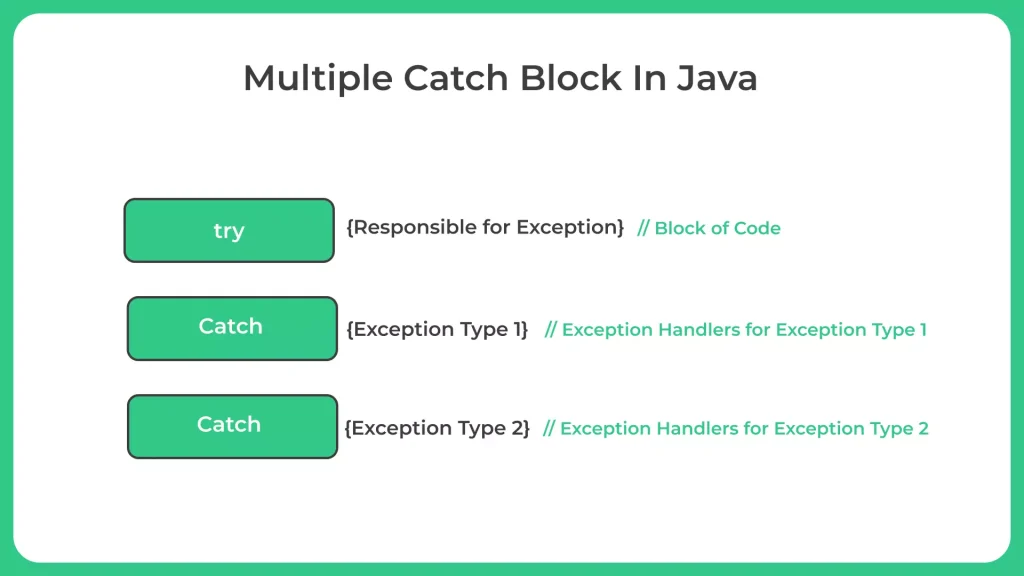Java catch Multiple Exceptions

Explain Java catch Multiple Exceptions?
The catch block is used to deal with exceptions that are generated by your program.
If there are several different types of exceptions that could occur in a specific piece of code, you can use one catch block to handle all of them at once.
To understand the Java Catch Multiple Exceptions, Read the Complete Article.
Handle Multiple Exceptions in a catch Block:
Using a method known as “multi-catch” in Java, you can handle many exceptions in a single catch block. This enables you to reduce code duplication and organise your exception-handling code.
The sorts of exceptions you want to catch must be separated by the pipe (|) symbol in order to handle multiple exceptions in a catch block.
try {
// code that may throw exceptions
} catch (ExceptionType1 | ExceptionType2 | ... | ExceptionTypeN exceptionVariable) {
// exception handling code for any of the specified exception types
}
try {
// code that may throw exceptions
} catch (Exception e) {
// exception handling code
}

Let’s look at the Java Catch Multiple Exceptions to perform certain operations.
Example 1: Java program to create one dimensional Array:
//MultipleCatchBlocksExample
public class Main
{
public static void main (String[]args)
{
try
{
// code that may throw exceptions
int[] arr = new int[5];
arr[10] = 50;
} catch (ArrayIndexOutOfBoundsException e)
{
// exception handling code for ArrayIndexOutOfBoundsException
System.out.println ("An ArrayIndexOutOfBoundsException occurred: " +
e.getMessage ());
} catch (ArithmeticException e)
{
// exception handling code for ArithmeticException
System.out.println ("An ArithmeticException occurred: " +
e.getMessage ());
} catch (Exception e)
{
// exception handling code for any other type of exception
System.out.println ("An exception occurred: " + e.getMessage ());
}
}
}
Output
An ArrayIndexOutOfBoundsException occurred: Index 10 out of bounds for length 5
Example 2 : Java Program to Handle Multiple Exceptions in a catch Block
import java.io.IOException;
import java.net.SocketException;
import java.net.UnknownHostException;
//MultipleExceptionsExample
public class Main
{
public static void main (String[]args)
{
try
{
// code that may throw exceptions
if (args.length == 0)
{
throw new IllegalArgumentException ("No arguments provided.");
}
else if (args.length == 1)
{
throw new SocketException ("Socket error occurred.");
}
else
{
throw new UnknownHostException ("Unknown host error occurred.");
}
}
catch (IOException | IllegalArgumentException ex)
{
// exception handling code for IOException or IllegalArgumentException
System.out.
println ("An I/O or illegal argument exception occurred: " +
ex.getMessage ());
}
catch (Exception ex)
{
// exception handling code for any other type of exception
System.out.println ("An exception occurred: " + ex.getMessage ());
}
}
}
Output
An I/O or illegal argument exception occurred: No arguments provided.
Example 3 : Java Program to Catching base exception class only:
public class Main
{
public static void main (String[]args)
{
try
{
// code that may throw exceptions
String str = null;
System.out.println (str.length ());
} catch (Exception e)
{
// exception handling code for any type of exception
System.out.println ("An exception occurred: " + e.getMessage ());
}
}
}
Output
An exception occurred: null
Example 4 : Java Program to Catching base and child exception classes :
public class Main {
//CatchBaseAndChildExceptionExample
public static void main(String[] args) {
try {
// code that may throw exceptions
String str = null;
System.out.println(str.length());
} catch (NullPointerException e) {
// exception handling code for NullPointerException
System.out.println("A NullPointerException occurred: " + e.getMessage());
} catch (Exception e) {
// exception handling code for any other type of exception
System.out.println("An exception occurred: " + e.getMessage());
}
}
}
Output
A NullPointerException occurred: null
Prime Course Trailer
Related Banners
Get PrepInsta Prime & get Access to all 200+ courses offered by PrepInsta in One Subscription
Get over 200+ course One Subscription
Courses like AI/ML, Cloud Computing, Ethical Hacking, C, C++, Java, Python, DSA (All Languages), Competitive Coding (All Languages), TCS, Infosys, Wipro, Amazon, DBMS, SQL and others






Login/Signup to comment